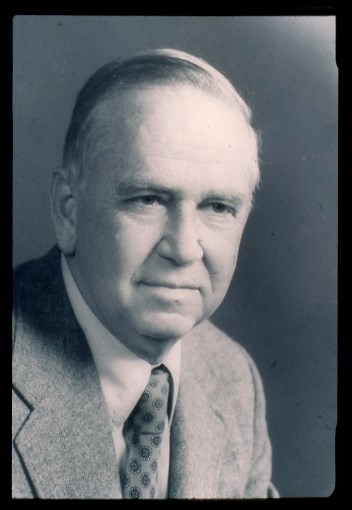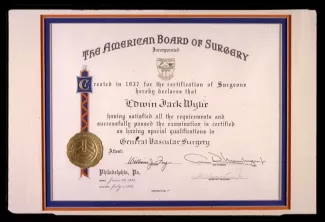E. J. Wylie, M.D.
E. J. Wylie, M.D.

1918-1982
With the death of Edwin Jack Wylie on September 2, 1982, vascular surgery has indeed lost one of its pioneering giants. Among his many honors, perhaps those most cherished were presidencies of both the North American Chapter of the International Society for Cardio Vascular Surgery, in 1970, and the Society for Vascular Surgery in 1980.
Jack Wylie was born in Ohio in 1918 and spent most of his life on the West Coast. He was raised in Southern California and in 1939 graduated from Pomona College, where he was elected to Phi Beta Kappa. After receiving his M.D. degree from Harvard University in 1943, he completed a general surgery internship at the New York Hospital-Cornell Medical College and began a brief residency in urology before moving to San Francisco and the University of California, San Francisco Medical Center where he completed his general surgery residency under H. Glenn Bell. He remained a member of the faculty from 1948 to 1982, interrupted by a tour of duty as a captain in the U.S. Army located in Nuremberg, Germany, from 1953 to 1955.
At the University of California, San Francisco, Dr. Wylie became professor and vice-chairman of the Department of Surgery and was chief of the Vascular Surgery Service until his unexpected death from a myocardial infarction.
Wylie was always at the forefront of surgical innovation. Stimulated by the reports of J. Cid dos Santos in Portugal, he was the first to apply successfully the technique of thromboendarterectomy in atherosclerotic aortoiliac occlusive disease in the United States as reported inSurgery, Obstetrics and Gynecologyin 1951. He subsequently employed endarterectomy to disobliterate all of the major aortic branches.
He maintained an abiding interest over the years in the etiology of and the perfecting of operative procedures for cerebrovascular insufficiency, which included direct and indirect measurement of carotid “stump” pressure as an indication of collateral flow and the diagnosis and treatment of carotid dissection and extracranial fibromuscular dysplasia. He was one of the original participants in the Joint Study of Extracranial Arterial Occlusion that was organized in 1959 to assess the current state of medical and surgical treatment. He was the senior co-author in 1970 of one of the first comprehensive texts on the topic entitled: Extracranial Occlusive Cerebrovascular Disease: Diagnosis and Management. He was further concerned with investigating the pathogenesis of carotid atherosclerosis and was actively involved in the research of the role of intraplaque hemorrhage in the development of acute symptoms of cerebral ischemia.
Wylie's additional special interests were in the development of techniques for the treatment and management of chronic visceral ischemia, the effects of lumbar sympathectomy in patients with severe peripheral atherosclerosis, the treatment of renal artery atherosclerosis and fibromuscular dysplasia causing renovascular hypertension, and the employment of autogenous tissue revascularization techniques. Arterial autografts that he first espoused are used mostly in renal artery repairs as well as a host of other technically challenging problems.
The acme of Wylie's technical experience and operative philosophy was reflected in the publication of Volume I of theManual of Vascular Surgery. Wylie was actively working on Volume II at the time of his death. This work has since been completed by his long time colleagues from the vascular surgical service.
Wylie received many international honors for his contributions to vascular surgery, and at the year of his death, he was made an honorary fellow of the Royal Australasian College of Surgeons.
The title of his presidential address for the International Society for Cardio Vascular Surgery was entitled: “Vascular Surgery--A Quest for Excellence,” and no other phrase so aptly characterizes his entire career. He was continuously involved with training of students, residents and fellows and initiated one of the first post-graduate training programs in peripheral vascular surgery. At the time of his death, he had trained some 33 clinical fellows who are located in the United States, Canada, Australia, Holland and South Africa.
Jack Wylie will be missed by all in his field for his contributions, integrity, wit and abiding enthusiasm for the study of all aspects of vascular disease.
W.K. Ehrenfeld
Copyright © 2011 The Regents of The University of California.

Dr. Wylie - Certifcate Number 1 in Vascular Surgery from the American Board of Surgery
